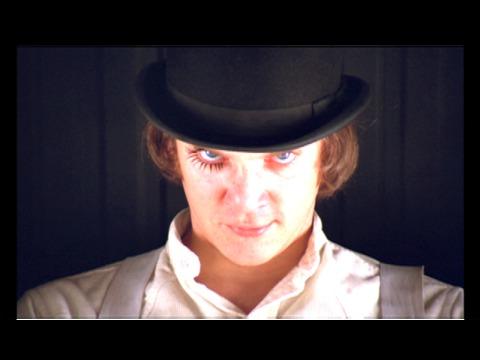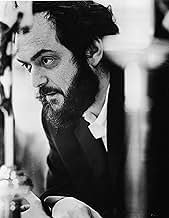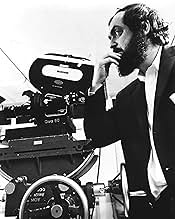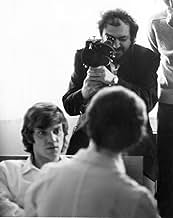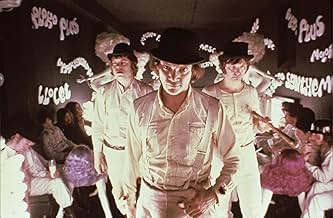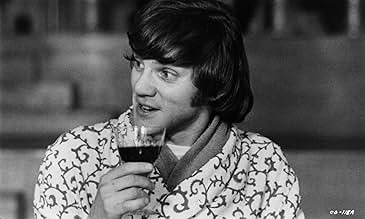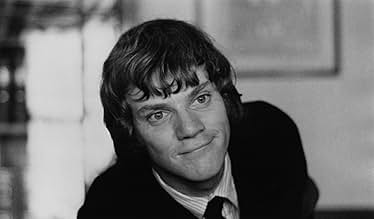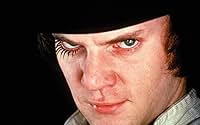Dans un monde du futur, un chef de gang sadique est emprisonné et se porte volontaire pour une expérience, mais tout ne se passe pas comme prévu.Dans un monde du futur, un chef de gang sadique est emprisonné et se porte volontaire pour une expérience, mais tout ne se passe pas comme prévu.Dans un monde du futur, un chef de gang sadique est emprisonné et se porte volontaire pour une expérience, mais tout ne se passe pas comme prévu.
- Nommé pour 4 Oscars
- 12 victoires et 26 nominations au total
Director's Trademarks: A Guide to Stanley Kubrick's Films
Director's Trademarks: A Guide to Stanley Kubrick's Films
2001: A Space Odyssey and Eyes Wide Shut are just the beginning of Stanley Kubrick's legacy. Are you up to speed on the film icon's style?
Histoire
Le saviez-vous
- AnecdotesMalcolm McDowell's eyes were anesthetized for the torture scenes so that he would film for periods of time without too much discomfort. Nevertheless his corneas got repeatedly scratched by the metal lid locks.
- GaffesMany of the continuity errors are not in fact errors. Stanley Kubrick purposely included many continuity errors as a way of creating a feeling of disorientation for the audience. That is why people's positions change, props are reorganized, and hats (and other articles of clothing) appear and disappear.
- Crédits fousThere are no opening credits after the title, which is followed by the opening shot of Alex the Droog. Although it is now commonplace for major films to not have opening credits, in 1971 it was considered rather unusual and was considered a trademark of director Stanley Kubrick.
- Versions alternativesIn 1973, a new version of "A Clockwork Orange" was released to theaters with an MPAA rating of "R", replacing the previous "X". The new version contained approximately 31 seconds of replacement, less lascivious footage for two scenes: the high speed (2 fps) orgy in Alex's bedroom, and the Ludovico rape scene. The bedroom scene was made more comical by having one of the girls fall off the bed and Alex joins her down there. The Ludovico rape scene was altered in that the scenes with the first two droogs was from the side and waist-up, so it is less explicit. The third droog was removed completely and replaced with a close-up of one of the doctor's face as they are watching Alex's treatment.
- ConnexionsEdited from Le triomphe de la volonté (1935)
- Bandes originalesSymphony No.9 in D Minor, Opus 125 Choral: II. Scherzo. Molto vivace
Written by Ludwig van Beethoven
Recorded by Deutsche Grammophon Gesellschaft
Commentaire à la une
I would say that the movie is really a gem of an art piece. The use of excellent imagery coupled with pretty out-of-the-place background score tells us about the uniqueness of this movie. Stanley Kubrick has really applied a lot of thought into this.
The director wants the audience to feel something as bad not because he is showing it as bad but because it really is bad. The background music accompanying the ultra violent scenes is comical, and not dramatic or anything else that is commonly associated with such scenes. This gives the viewer an opportunity to feel the bitterness not because the music hints so but because he himself feels so. Viewer's emotions should arise irrespective of what the director is trying to show, and this is one of the greatest successes of the movie.
Another glorifying feature is the central idea of the movie. If a human is striped of the choice to choose from good and evil, he no longer remains a human, he becomes a clockwork. When Alex is brain-washed and "programmed" to choose only good, he wasn't accepted by the society and this shows the irony in the objectives of the British Government. The word Orange from the title presumably comes from the word "Ourange" that loosely means man. And hence the title is so appropriate to the movie.
The artificiality in dialogues and sets give the movie a unique feature and enhance the grip on it. This also means that the viewer has to get more involved. This is definitely one of the best technically shot movies, another masterpiece of Kubrick like the Space Oddessey.
For the uninitiated, set in near future Britain, the movie shows Malcom MacDowell as the head of a group of youngsters involved in sexual violence. Turn of the events leave the protagonist in the hands of the police. Worried by the growing number of prisoners the British Government devises a method of "programming" them so that they always choose the good. Alex is chosen as one of those on which the new system is to be tested. The rest unfolds as a saga of the very human characteristic.
Lastly, I would like to say that you may be compelled to leave the movie in between, but if you are watching it for art and cinematic experience, I recommend you to sit through.
The director wants the audience to feel something as bad not because he is showing it as bad but because it really is bad. The background music accompanying the ultra violent scenes is comical, and not dramatic or anything else that is commonly associated with such scenes. This gives the viewer an opportunity to feel the bitterness not because the music hints so but because he himself feels so. Viewer's emotions should arise irrespective of what the director is trying to show, and this is one of the greatest successes of the movie.
Another glorifying feature is the central idea of the movie. If a human is striped of the choice to choose from good and evil, he no longer remains a human, he becomes a clockwork. When Alex is brain-washed and "programmed" to choose only good, he wasn't accepted by the society and this shows the irony in the objectives of the British Government. The word Orange from the title presumably comes from the word "Ourange" that loosely means man. And hence the title is so appropriate to the movie.
The artificiality in dialogues and sets give the movie a unique feature and enhance the grip on it. This also means that the viewer has to get more involved. This is definitely one of the best technically shot movies, another masterpiece of Kubrick like the Space Oddessey.
For the uninitiated, set in near future Britain, the movie shows Malcom MacDowell as the head of a group of youngsters involved in sexual violence. Turn of the events leave the protagonist in the hands of the police. Worried by the growing number of prisoners the British Government devises a method of "programming" them so that they always choose the good. Alex is chosen as one of those on which the new system is to be tested. The rest unfolds as a saga of the very human characteristic.
Lastly, I would like to say that you may be compelled to leave the movie in between, but if you are watching it for art and cinematic experience, I recommend you to sit through.
- varun_iitian
- 27 juil. 2004
- Permalien
Meilleurs choix
Connectez-vous pour évaluer et suivre la liste de favoris afin de recevoir des recommandations personnalisées
Détails
- Date de sortie
- Pays d’origine
- Langue
- Aussi connu sous le nom de
- Naranja mecánica
- Lieux de tournage
- Binsey Walk, Southmere Lake, Thamesmead South, Londres, Angleterre, Royaume-Uni(Alex puts Dim in water - houses demolished)
- Sociétés de production
- Voir plus de crédits d'entreprise sur IMDbPro
Box-office
- Budget
- 2 200 000 $US (estimé)
- Montant brut aux États-Unis et au Canada
- 26 617 553 $US
- Montant brut mondial
- 27 034 174 $US
- Durée2 heures 16 minutes
- Couleur
- Mixage
- Rapport de forme
- 1.66 : 1
Contribuer à cette page
Suggérer une modification ou ajouter du contenu manquant


